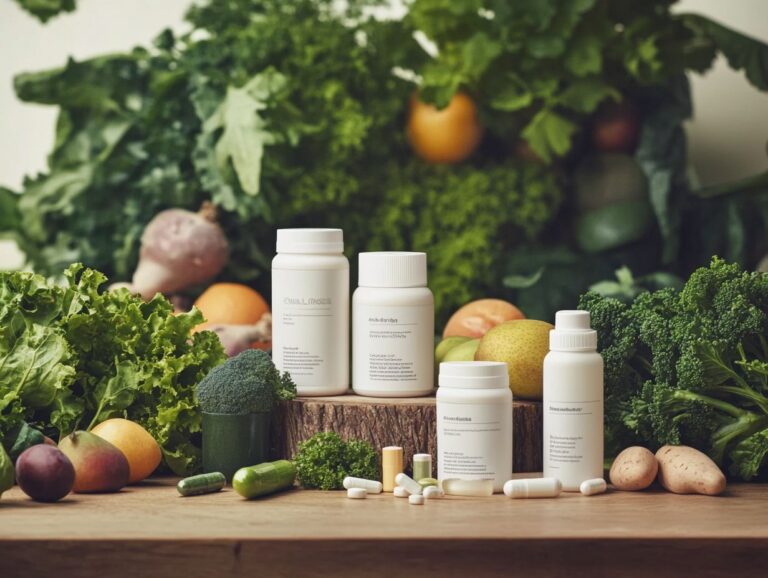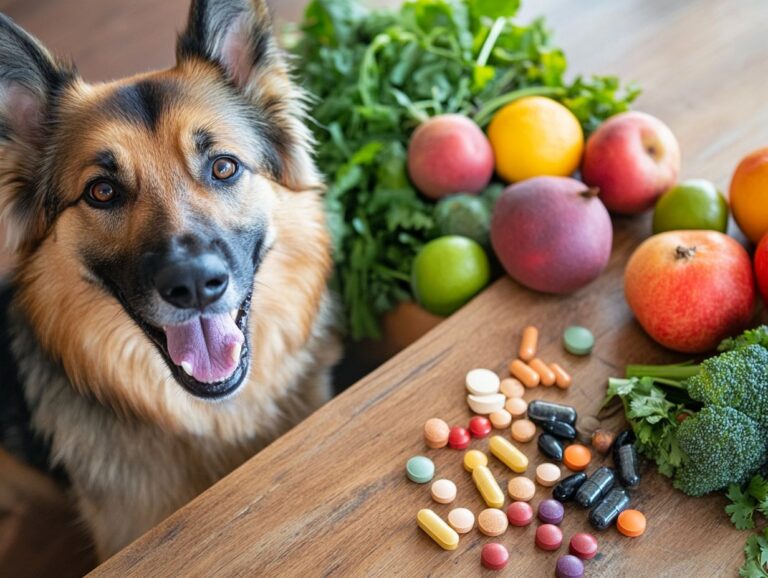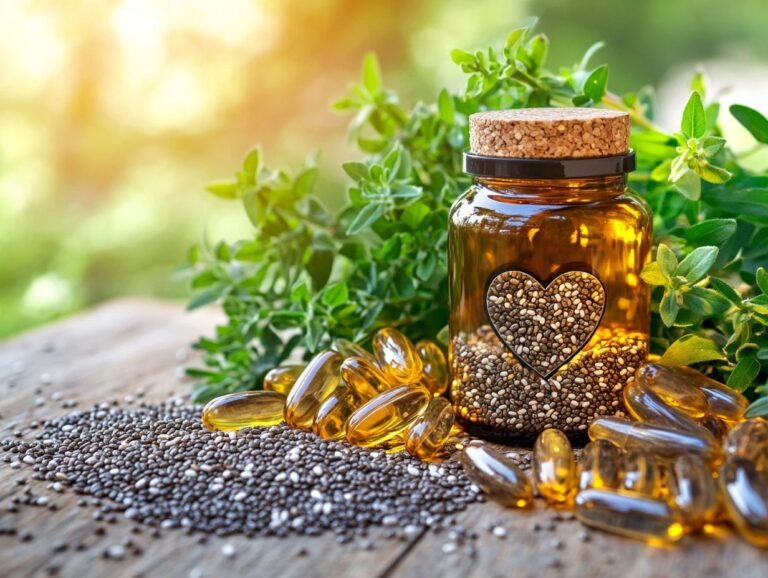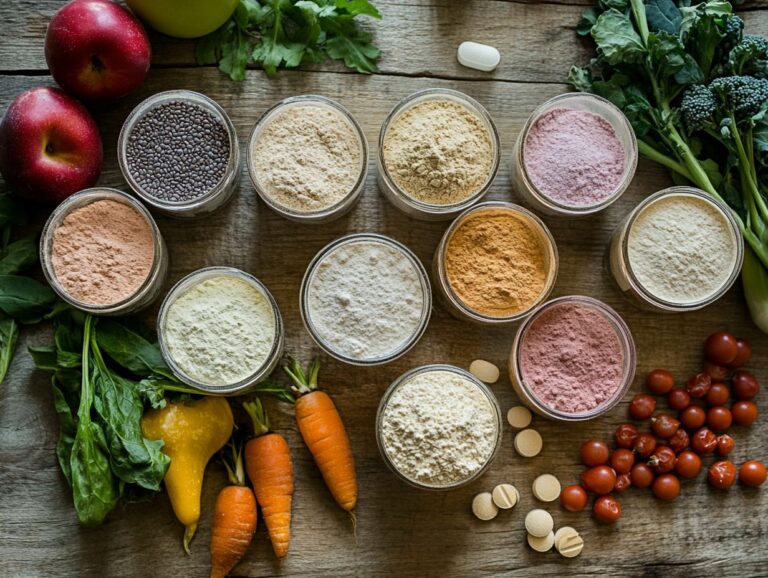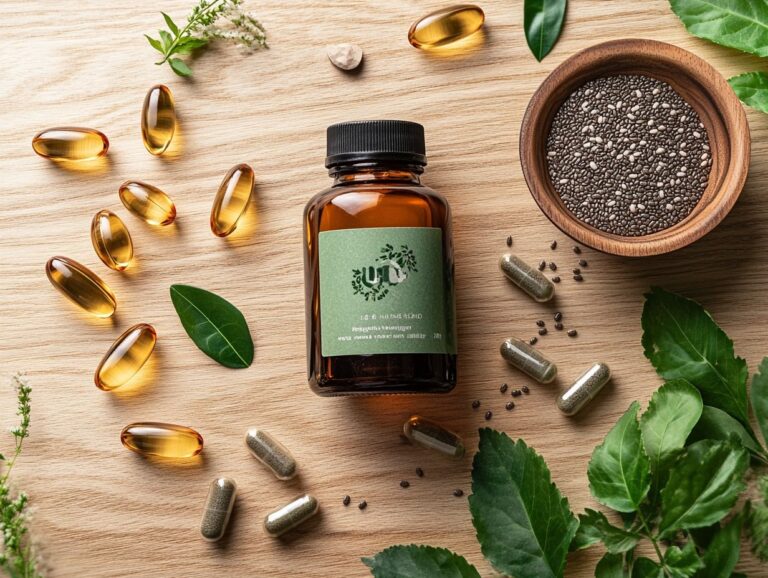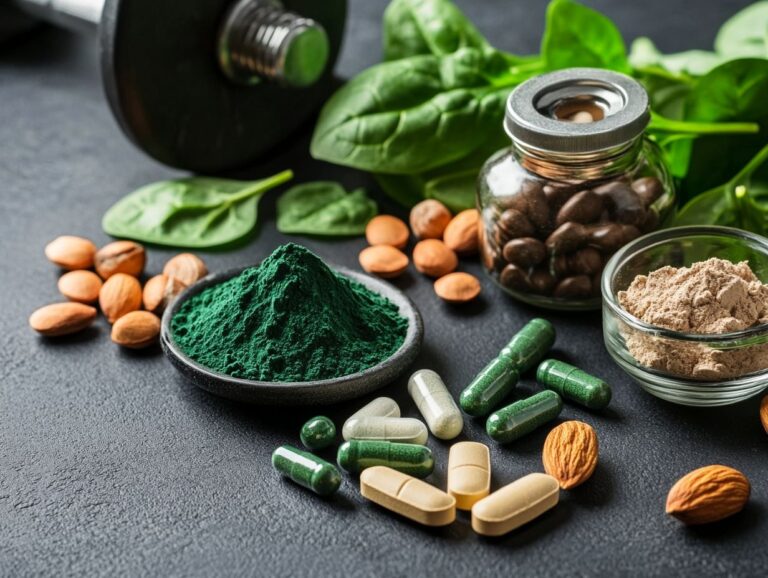Maintaining adequate iron levels is essential for everyone, but it can be particularly challenging for those following a vegan diet. This article explores the best vegan sources of iron, such as legumes, dark leafy greens, whole grains, nuts, seeds, and dried fruits. It also discusses effective vegan iron supplements, highlighting various forms and offering guidance on how to select the right one for your needs. Additionally, you will find practical tips to prevent iron deficiency while adhering to a plant-based lifestyle. Read on to empower your health with iron-rich choices!
Key Takeaways:
- Choose iron supplements wisely: opt for plant-based options and check for type, dosage, additional nutrients, and quality.
- Prevent iron deficiency by incorporating iron-rich foods in your diet, pairing them with vitamin C, and avoiding iron inhibitors.
- The best vegan iron sources include legumes and beans, dark leafy greens, whole grains, nuts and seeds, and dried fruits.
What are the Best Vegan Sources of Iron? Exploring Real Food Options and Dietary Considerations
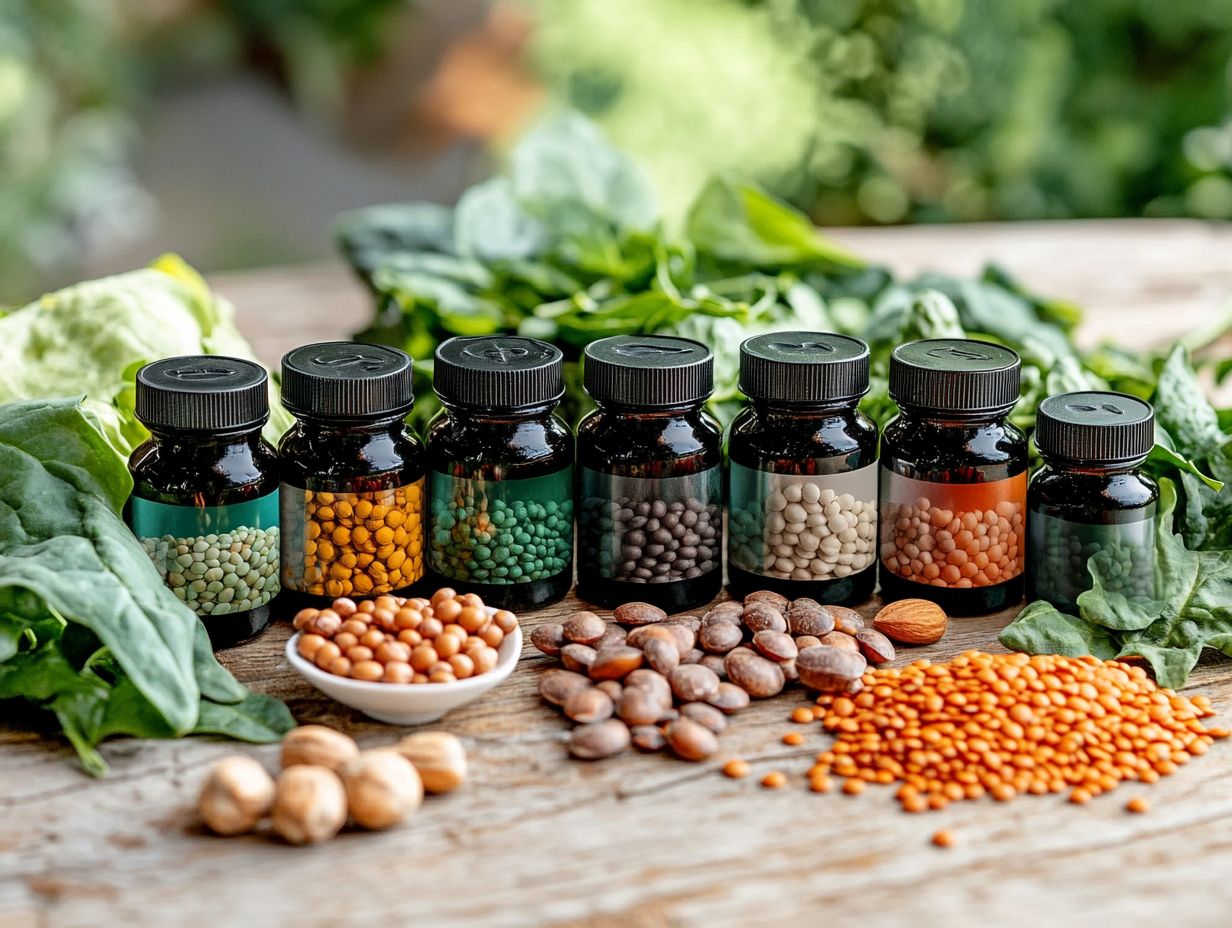 Iron is a vital mineral that the body uses to produce hemoglobin and myoglobin, which are responsible for carrying oxygen throughout the body. It is essential for proper cell function and the synthesis of certain hormones, including those involved in energy levels and overall well-being. Iron-rich red blood cells store and transport oxygen from the lungs to various tissues and organs. Dietary sources of iron are crucial, particularly for individuals following vegan or vegetarian diets, to maintain optimal iron levels and prevent iron deficiency anemia. A deficiency in iron can lead to various health issues, including fatigue and anemia. Below are some vegan sources of iron, along with tips on how to incorporate them into your daily diet, making it easier to choose foods that help achieve maximum iron levels and improve nutrient absorption. Including these sources in your meals can have a positive effect on your overall health. Consuming iron-rich foods can significantly enhance your energy levels and overall health.
Iron is a vital mineral that the body uses to produce hemoglobin and myoglobin, which are responsible for carrying oxygen throughout the body. It is essential for proper cell function and the synthesis of certain hormones, including those involved in energy levels and overall well-being. Iron-rich red blood cells store and transport oxygen from the lungs to various tissues and organs. Dietary sources of iron are crucial, particularly for individuals following vegan or vegetarian diets, to maintain optimal iron levels and prevent iron deficiency anemia. A deficiency in iron can lead to various health issues, including fatigue and anemia. Below are some vegan sources of iron, along with tips on how to incorporate them into your daily diet, making it easier to choose foods that help achieve maximum iron levels and improve nutrient absorption. Including these sources in your meals can have a positive effect on your overall health. Consuming iron-rich foods can significantly enhance your energy levels and overall health.
1. Legumes and Beans: A Plant-Based Nutrient Powerhouse
Legumes and beans are among the best plant-based sources of iron, making them an excellent option for vegans and vegetarians seeking to boost their iron levels quickly. Nutrient-dense foods like lentils, chickpeas, and black beans are not only rich in iron but also packed with a variety of other vitamins and minerals. In particular, lentils provide approximately 3.3 milligrams of iron per cooked cup, while chickpeas offer about 4.7 milligrams. Legumes can be easily incorporated into meals such as salads, soups, and stews. When consumed alongside foods high in vitamin C, like bell peppers or citrus fruits such as oranges, the iron from legumes is absorbed more effectively, enhancing its bioavailability. This is crucial for maintaining good health and preventing deficiencies, especially in those with higher iron needs.
2. Dark Leafy Greens: Iron-Rich Options for Vegetarians and Vegans
Dark leafy greens, such as spinach and kale, are nutrient-dense foods that provide not only iron but also essential vitamins and minerals beneficial for vegan diets, including folic acid and vitamin C. These greens are particularly rich in iron, with spinach containing approximately 3.6 mg per 100 grams and kale offering around 1.5 mg. However, the absorption of iron from plant sources can be less efficient due to the presence of oxalates and phytates. To maximize iron absorption, it is recommended to prepare these greens by steaming or saut ing, as these methods reduce anti-nutritional factors. Additionally, pairing them with sources of vitamin C, such as bell peppers or citrus fruits, can significantly enhance iron absorption. This strategy not only improves iron utilization but also helps alleviate common gastrointestinal side effects associated with consuming high-iron leafy greens.
3. Whole Grains: A Foundation for Healthy Red Blood Cells
Whole grains are an important source of iron for vegans, supplying essential nutrients that support the development of red blood cells and overall energy levels. Incorporating a diverse variety of whole grains into a daily meal plan can significantly enhance dietary iron intake, thereby positively impacting overall health. Here are some notable whole grains and their health benefits:
- Certified Kosher and Gluten-Free Options: Many whole grains meet these dietary needs, making them suitable for diverse dietary preferences.
- Quinoa: Often regarded as a superfood, quinoa boasts a complete protein profile, providing all the essential amino acids while also being a good source of iron.
- Brown Rice: A staple food in many countries, brown rice has a nutty flavor and chewy texture, contributing to the body s iron needs.
- Oats: Typically enjoyed at breakfast, oats are a versatile addition to any meal. They offer fiber and iron, which aid in digestion and boost energy.
It is important for consumers to be aware of any potential allergens or side effects associated with these grains, as such issues could negate the benefits of an iron-rich diet.
4. Nuts and Seeds: Small Packages of Iron and Nutrients
Nuts and seeds are excellent sources of iron, along with healthy fats and other essential nutrients that contribute to a balanced vegan diet. Among the best options are pumpkin seeds and cashews. Pumpkin Seeds: Also known as pepitas, pumpkin seeds rank as one of the highest sources of iron, containing 8.8 mg of iron per 100 grams. They can be enjoyed as a snack or used as a topping for soups and salads. Cashews: Cashews provide a modest 6.7 mg of iron per 100 grams, but they are also good sources of copper and magnesium. They can easily be incorporated into stir-fry dishes, smoothies, or sauces. Both pumpkin seeds and cashews can enhance daily iron intake, especially when consumed alongside vitamin C-rich foods such as oranges and bell peppers, which improve iron absorption. Including these in a balanced diet can help manage side effects while boosting energy levels. However, it is important to be mindful of portion sizes, as nuts and seeds can be common allergens and excessive consumption may lead to obesity and other health issues.
5. Dried Fruits
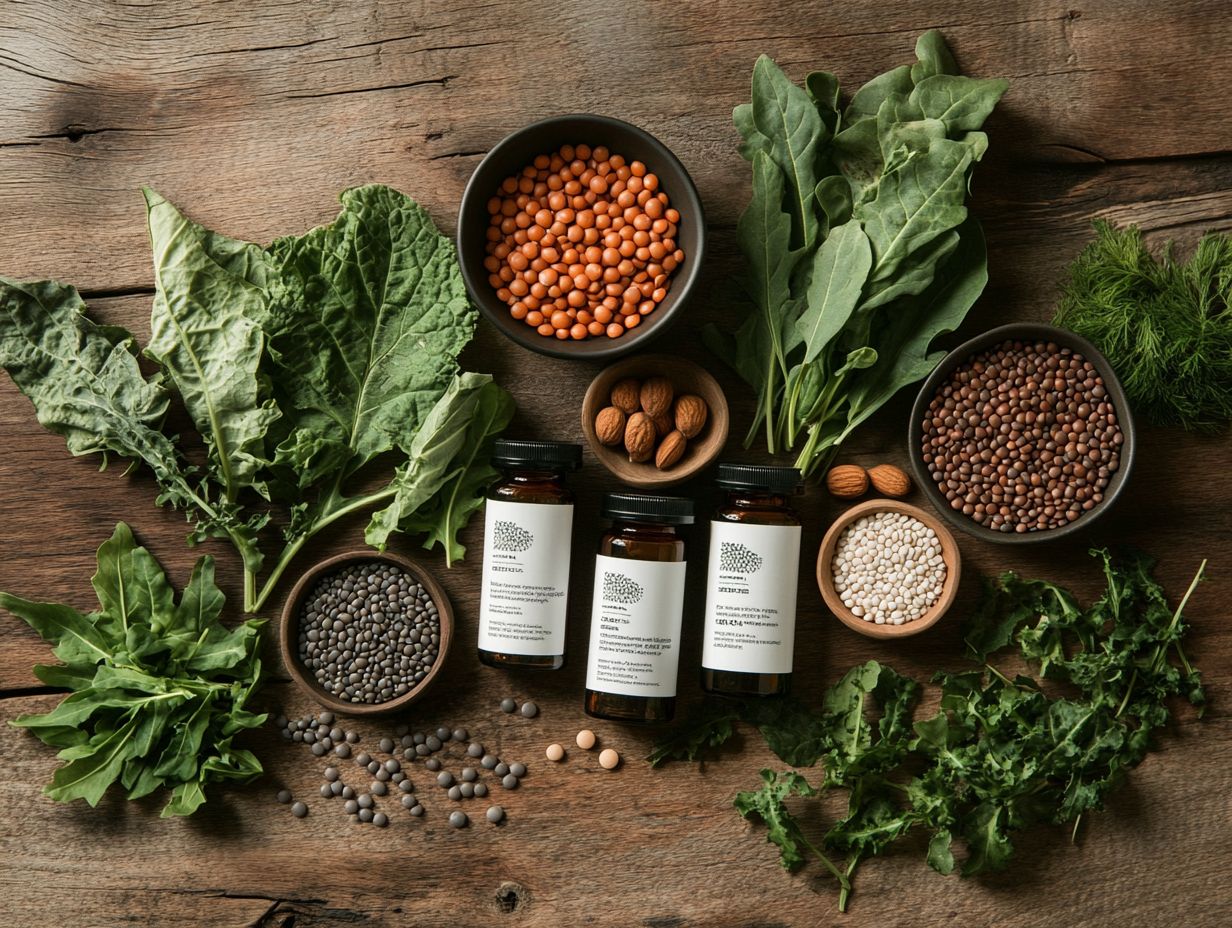 Nutrient: Dried Fruits (Apricots, Raisins) Nutritional Value: Source of Iron Benefits of Dried Fruits for Iron: Dried fruits, particularly apricots and raisins, are excellent sources of iron and serve as a beneficial snack for vegans. Daily consumption of iron-rich foods from this category can significantly enhance iron intake, which is essential for maintaining energy levels and overall health. Nutritional Value of Dried Fruits: Along with iron, dried fruits also contain vitamin A, potassium, and fiber, all of which support digestion and cardiovascular health. How to Consume Dried Fruits for Iron: Dried fruits can be incorporated into breakfast cereals, salads, or trail mixes, making them a healthy addition to balanced meals. Consider pairing with other plant-based sources for an iron-rich snack that supports daily nutrient needs. Risks of Consuming Dried Fruits for Iron: It is important to note that overconsumption of dried fruits can lead to nausea or constipation. Pairing with Vitamin C: To enhance iron absorption, consider pairing dried fruits with foods rich in vitamin C, such as oranges or strawberries.
Nutrient: Dried Fruits (Apricots, Raisins) Nutritional Value: Source of Iron Benefits of Dried Fruits for Iron: Dried fruits, particularly apricots and raisins, are excellent sources of iron and serve as a beneficial snack for vegans. Daily consumption of iron-rich foods from this category can significantly enhance iron intake, which is essential for maintaining energy levels and overall health. Nutritional Value of Dried Fruits: Along with iron, dried fruits also contain vitamin A, potassium, and fiber, all of which support digestion and cardiovascular health. How to Consume Dried Fruits for Iron: Dried fruits can be incorporated into breakfast cereals, salads, or trail mixes, making them a healthy addition to balanced meals. Consider pairing with other plant-based sources for an iron-rich snack that supports daily nutrient needs. Risks of Consuming Dried Fruits for Iron: It is important to note that overconsumption of dried fruits can lead to nausea or constipation. Pairing with Vitamin C: To enhance iron absorption, consider pairing dried fruits with foods rich in vitamin C, such as oranges or strawberries.
What are the Best Vegan Iron Supplements? Exploring Safety and Quality
For vegans and vegetarians who struggle to meet their iron requirements solely through food sources, iron supplements, including options like ferrous bisglycinate and multivitamins, can be an effective solution to help maintain optimal iron levels and prevent iron deficiency anemia. These supplements can enhance the production of healthy red blood cells and support overall well-being. These supplements are available in various formulations, including ferrous sulfate, ferrous fumarate, and ferrous gluconate, and the choice of supplement can significantly affect absorption and overall health. When selecting an iron supplement, it is important to consider factors such as the type of iron used, dosage, and potential side effects, especially for individuals with sensitive stomachs. Moreover, plant-based iron supplements are emerging as a popular, clean, and effective alternative for those seeking a safe way to enhance their iron levels. Products such as Blood Builder by PlantFusion and other non-GMO, gluten-free, and certified kosher options are available for those with specific dietary needs.
1. Ferrous Sulfate: A Common Choice for Effective Iron Supplementation
Ferrous sulfate is one of the most commonly prescribed forms of iron supplements. It has been shown to be effective in increasing iron levels and treating iron deficiency. This form of iron offers several advantages, including low cost and high bioavailability, which means it is absorbed by the body more easily than other forms of iron. In adults, the typical recommended dosage ranges from 100 to 200 mg per day, usually divided into multiple doses to maximize absorption. However, some individuals may experience side effects, particularly gastrointestinal issues such as constipation and nausea. These side effects can be minimized by taking ferrous sulfate with vitamin C or acidic foods, which can enhance absorption and alleviate gastrointestinal discomfort.
2. Ferrous Fumarate: An Effective Solution with Fewer Side Effects
Ferrous fumarate is an iron supplement known for its good absorption rates and effectiveness in treating iron deficiency. It is suitable for both vegans and vegetarians. This formulation is particularly valued for its ability to quickly restore iron levels without causing the gastrointestinal side effects often associated with other iron supplements. Many people prefer ferrous fumarate because it is less likely to cause constipation and discomfort in the gastrointestinal tract. Additionally, taking ferrous fumarate with vitamin C significantly enhances iron absorption, making it an excellent choice for those with iron deficiency. When combined with vitamin C, it not only increases iron uptake but also helps to minimize side effects.
3. Ferrous Gluconate: A Gentle Option for Sensitive Stomachs
Ferrous gluconate is an iron supplement that is gentler than many other forms of iron, making it a popular choice for individuals with sensitive stomachs due to its fewer gastrointestinal side effects. This formulation allows for easier digestion and absorption compared to harsher alternatives, enabling many people who have struggled with other iron supplements to tolerate ferrous gluconate effectively. It is often recommended to be taken on an empty stomach to maximize absorption, unless gastrointestinal discomfort occurs. Most users have reported positive changes in their energy levels and overall well-being after taking it, which has made it a highly sought-after supplement for those with iron deficiency anemia or for individuals who cannot consume iron-rich foods. Clinical trials have shown its efficacy in improving hemoglobin and myoglobin levels in the blood. For optimal absorption, it is recommended to take ferrous gluconate with vitamin C and to avoid consuming it alongside calcium-rich foods or supplements. Additionally, vitamin B12 can support overall nutrient absorption and metabolism.
4. Plant-based Iron Supplements
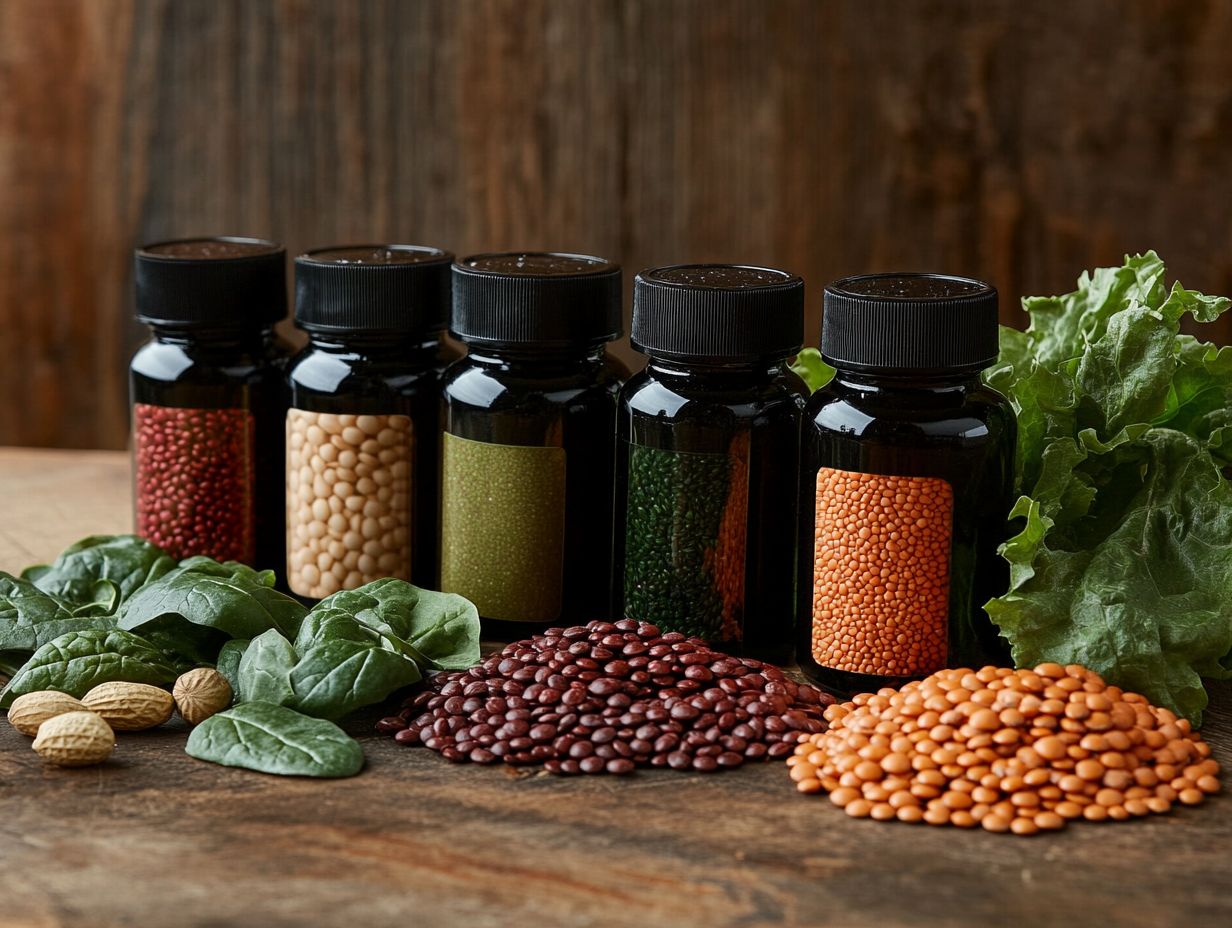 Plant-based iron supplements serve as an excellent source of iron for vegans, typically featuring non-GMO and gluten-free formulations that offer a clean and safe way to boost iron intake. These supplements often include organic ingredients to further ensure quality and safety. These supplements are formulated with ingredients such as spirulina, chlorella, and various legumes, which not only help increase iron levels but also provide other nutrients that contribute to overall health. Ingredients like beetroot offer additional benefits, including enhancing blood builder properties. Unlike traditional iron supplements, which may contain synthetic forms of iron that can lead to gastrointestinal distress, plant-based iron supplements are generally easier on the digestive system. Ferrous bisglycinate chelate is an example of a gentle yet effective form of iron used in these supplements. As consumers become more aware of the importance of efficacy and safety in these products, they are increasingly focused on selecting high-quality options that are rigorously tested to ensure purity and effectiveness. Brands like PlantFusion and resources like Healthline provide valuable information on choosing the best supplements.
Plant-based iron supplements serve as an excellent source of iron for vegans, typically featuring non-GMO and gluten-free formulations that offer a clean and safe way to boost iron intake. These supplements often include organic ingredients to further ensure quality and safety. These supplements are formulated with ingredients such as spirulina, chlorella, and various legumes, which not only help increase iron levels but also provide other nutrients that contribute to overall health. Ingredients like beetroot offer additional benefits, including enhancing blood builder properties. Unlike traditional iron supplements, which may contain synthetic forms of iron that can lead to gastrointestinal distress, plant-based iron supplements are generally easier on the digestive system. Ferrous bisglycinate chelate is an example of a gentle yet effective form of iron used in these supplements. As consumers become more aware of the importance of efficacy and safety in these products, they are increasingly focused on selecting high-quality options that are rigorously tested to ensure purity and effectiveness. Brands like PlantFusion and resources like Healthline provide valuable information on choosing the best supplements.
How to Choose the Right Iron Supplement?
Selecting the best iron supplement involves understanding the various types and dosages of iron available, as well as identifying additional nutrients that can enhance absorption or minimize side effects. Personal health and dietary needs are significant factors in this decision, as is knowing which form of iron is most suitable for your body. It is also important to be aware of potential side effects and strategies to mitigate them, particularly for individuals with sensitive stomachs. Seeking guidance from a healthcare professional can assist you in choosing the right supplement to safely boost your energy levels and address iron deficiency. Proper side effects management is also crucial in this process.
1. Type of Iron
The type of iron found in supplements can significantly impact their absorption and bioavailability. Ferrous forms, such as ferrous sulfate and fumarate, are generally more bioavailable than non-ferrous forms like ferric citrate and iron polysaccharide. For those looking for highly absorbable options, ferrous bisglycinate chelate is a standout choice. Ferrous sulfate is a common iron supplement known for its strong absorption profile, making it frequently recommended for treating iron deficiency. It is so widely used that it is often simply referred to as “iron.” The CDC also endorses the use of ferrous sulfate for its effectiveness. On the other hand, non-ferrous options, such as ferric citrate, may have lower absorption rates but are often better tolerated by individuals who experience gastrointestinal irritation from ferrous supplements. For vegans and vegetarians, plant-derived iron supplements sourced from algae or lentils can provide sufficient absorption while aligning with their dietary preferences.
2. Dosage
The dosage of iron supplementation is crucial for safely achieving adequate iron levels while avoiding the risks of iron poisoning and other side effects. This is especially important for certain demographic groups, such as menstruating women, who typically have higher iron requirements due to blood loss during their menstrual cycles. Similarly, pregnant women have an increased need for iron to support the developing fetus, making supplementation necessary. Factors influencing dosage may include age, overall health, diet, and any pre-existing medical conditions. It’s important to avoid iron poisoning by adhering to recommended dosages. Anyone considering iron supplementation should consult their healthcare provider, who can offer personalized recommendations based on their individual health needs and circumstances.
3. Additional Nutrients
Additional nutrients, such as vitamin C and folic acid, enhance iron absorption when taking iron supplements. Vitamin C, found in citrus fruits like oranges and grapefruit, aids in converting iron into a form that the body can absorb more easily. It serves as a powerful enhancer that allows the gastrointestinal tract to uptake iron more efficiently. Folic acid, often found in leafy greens and legumes, is another crucial nutrient for iron utilization. Meanwhile, folic acid, which can be derived from leafy greens and legumes, is essential for the production of healthy red blood cells and works in conjunction with iron to boost the body s supply. Along with taking iron supplements, consuming foods rich in iron alongside those high in vitamin C and folic acid can maximize these benefits. For example, enjoying a salad made with spinach or lentils, both of which are high in iron, along with citrus fruits can be beneficial. Similarly, a bean-heavy main dish paired with a side of strawberries can enhance iron absorption. This combination ensures that both iron and the necessary co-factors are ingested for optimal absorption and utilization.
4. Quality and Purity
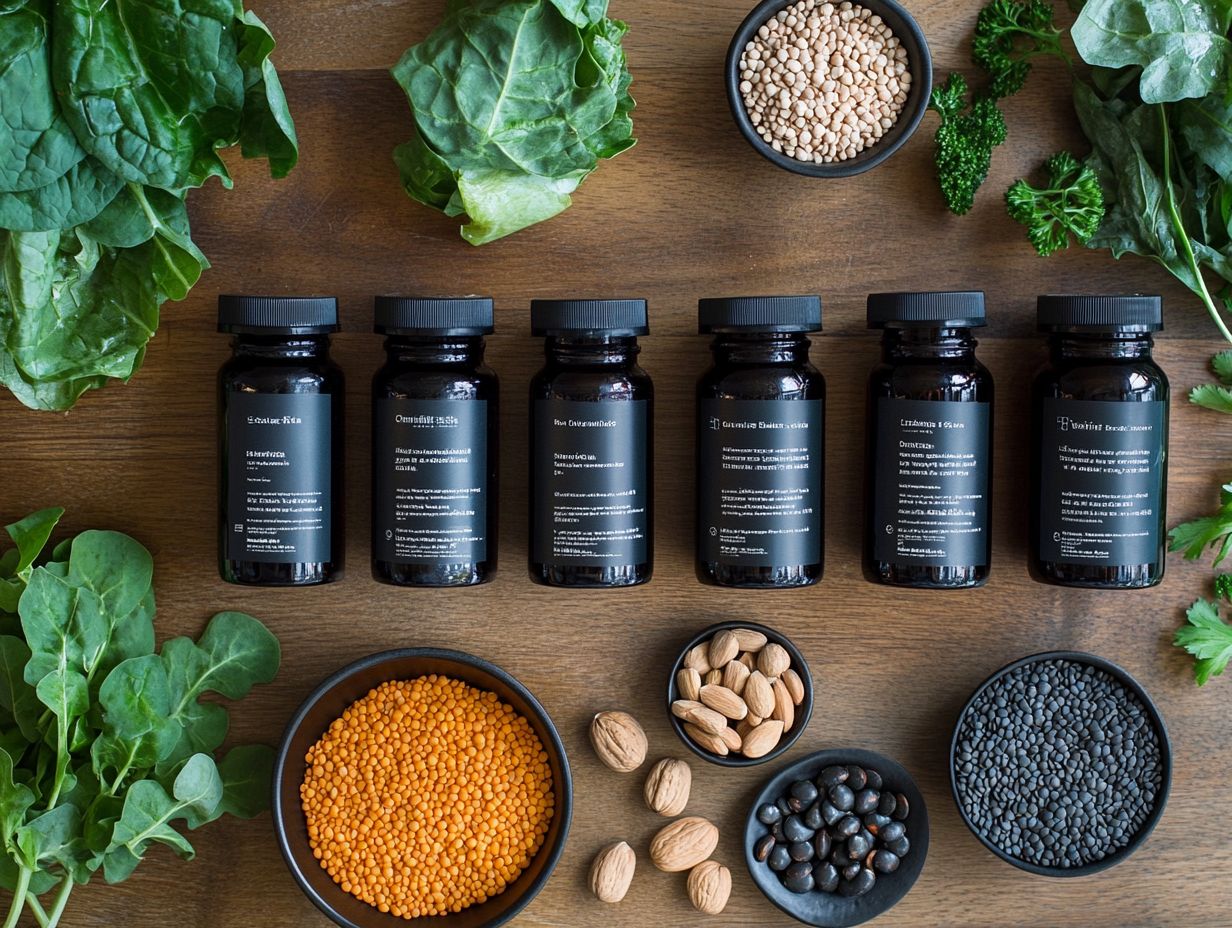 The quality and purity of iron supplements are crucial for safe and effective use, especially for those following a vegan diet. Consumers should seek iron supplements that are certified kosher, non-GMO, and gluten-free to ensure compatibility with their specific dietary needs. It is important to conduct thorough research on different brands prior to making a purchase. Consumers should look for manufacturers that provide comprehensive product information on their websites, including details on how and where ingredients are sourced, as well as the manufacturing process. Reviewing third-party testing results can offer valuable insights into the safety and effectiveness of a supplement, as independent verification helps ensure that a product is free from harmful contaminants and meets quality standards. This careful approach not only promotes optimal health but also boosts confidence in dietary choices.
The quality and purity of iron supplements are crucial for safe and effective use, especially for those following a vegan diet. Consumers should seek iron supplements that are certified kosher, non-GMO, and gluten-free to ensure compatibility with their specific dietary needs. It is important to conduct thorough research on different brands prior to making a purchase. Consumers should look for manufacturers that provide comprehensive product information on their websites, including details on how and where ingredients are sourced, as well as the manufacturing process. Reviewing third-party testing results can offer valuable insights into the safety and effectiveness of a supplement, as independent verification helps ensure that a product is free from harmful contaminants and meets quality standards. This careful approach not only promotes optimal health but also boosts confidence in dietary choices.
How to Prevent Iron Deficiency as a Vegan?
Vegans can prevent iron deficiency by incorporating iron-rich foods into their diet, ensuring these foods are paired with vitamin C-rich options, and avoiding common iron inhibitors that can hinder absorption. Consuming iron-rich foods such as legumes, dark leafy greens, and nuts alongside vitamin C-rich foods like oranges and beetroot will promote better iron absorption and help vegans maintain healthy iron levels. Additionally, knowing when to take iron supplements can play a crucial role in preventing anemia and fatigue. Consulting a healthcare professional can provide personalized advice tailored to individual needs.
1. Incorporate Iron-rich Foods in Diet
Incorporating iron-rich foods is essential for preventing iron deficiency and maintaining normal iron levels on a vegan diet. Individuals following a vegan diet can include a variety of iron sources, such as:
- Legumes like lentils and chickpeas
- Dark leafy greens such as spinach and kale
- Whole grains like quinoa and farro
Effective meal planning can help ensure that these foods are regularly included in meals throughout the day. For instance, one could have iron-rich oatmeal topped with pumpkin seeds for breakfast, accompanied by saut ed spinach. For lunch, options like bean chili or quinoa salad with mixed vegetables can enhance iron intake while adding variety to the diet.
2. Pair Iron-rich Foods with Vitamin C
Pairing iron-rich foods with vitamin C is one of the most effective ways to improve iron absorption in the body for individuals following a vegan diet. This pairing works because vitamin C converts non-heme iron, which is found in plant-based sources, into a more absorbable form. A clear example of this is the combination of legumes, such as lentils or chickpeas, with citrus fruits like oranges or grapefruits, which significantly enhances iron absorption. Similarly, dark green leafy vegetables such as spinach or kale can be paired with sliced bell peppers, and adding tomatoes to beans in salads provides the necessary vitamin C. To incorporate these pairings into meals, a simple drizzle of lemon or lime juice over a chickpea salad can add vitamin C, while saut ed kale can be enhanced by including red peppers. These straightforward additions can greatly improve nutrient absorption.
3. Avoid Iron Inhibitors
To effectively regulate iron levels, individuals must learn to avoid common iron inhibitors that restrict absorption, particularly in a vegan diet. It is important to recognize that calcium from dairy alternatives, phytates from whole grains and legumes, and tannins from certain teas are all significant iron inhibitors that limit the body s ability to absorb this essential mineral. To mitigate these effects, individuals should time their meals and supplements appropriately; for instance, they should consume iron-rich foods or take supplements at different times than high-calcium foods or drinks. Additionally, tea or coffee should be consumed between meals rather than with iron sources to maximize the absorption of the mineral.
4. Consider Iron Supplements
Vegans may need to take iron supplements if they are unable to meet their iron needs through a healthy diet and are at risk of developing iron deficiency. It is important for individuals to understand their own nutritional requirements and evaluate their personal eating habits before deciding whether to take iron supplements. Consulting a healthcare professional is recommended, as they possess the expertise and training necessary to assess one’s health history, current circumstances, and any potential challenges. If dietary sources of iron are insufficient, selecting the appropriate supplement becomes crucial. This includes choosing forms of iron that are easily absorbed and compatible with an individual’s overall nutritional intake, while avoiding any adverse reactions in their bodies.
